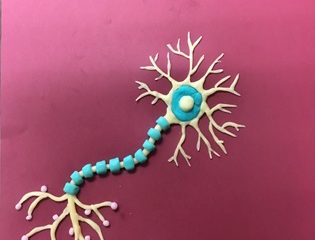Visiting with our daughter Karen. I had a chance to see how she teaches Social Media at the University of Louisville, see the 8th ranked Cardinals win at football and actually place some bets on the horses at Churchill downs!
Here is what I am reading today:
“”We hypothesized that sleep deprivation’s impact on hunger and decision making would make for the ‘perfect storm’ with regard to shopping and food purchasing — leaving individuals hungrier and less capable of employing self-control and higher-level decision-making processes to avoid making impulsive, calorie-driven purchases,” said first author Colin Chapman, MSc, of Uppsala University.”
What would happen if these two sets of microbes got mixed up in the gut, the researchers wondered. Led by microbiologist Jeffrey Gordon and graduate student Vanessa Ridaura, the team took advantage of one of the rodents’ least endearing habits: They eat each other’s poop. After letting this happen, the researchers discovered that microbes from the lean twins seemed to be particularly good at taking hold in the gut ecosystems of the mice that started with obesity-associated microbes.
“”The finding is a powerful example of how plastic the older brain is,” said Adam Gazzaley, MD, PhD, UCSF associate professor of neurology, physiology and psychiatry and director of the Neuroscience Imaging Center. Gazzaley co-founded the company, Akili Interactive Labs, which is developing the next generation of the video game.”
“What happens when you tell a lie? Set aside your ethical concerns for a moment—after all, lying is a habit we practice with astonishing dexterity and frequency, whether we realize it or not. What goes on in your brain when you willfully deceive someone? And what happens later, when you attempt to access the memory of your deceit? How you remember a lie may be impacted profoundly by how you lie, according to a new study by LSU Associate Professor Sean Lane and former graduate student Kathleen Vieria.”
“In the current study, Chiara Cirelli, MD, PhD, and colleagues at the University of Wisconsin, Madison, measured gene activity in oligodendrocytes from mice that slept or were forced to stay awake. The group found that genes promoting myelin formation were turned on during sleep. In contrast, the genes implicated in cell death and the cellular stress response were turned on when the animals stayed awake.
“These findings hint at how sleep or lack of sleep might repair or damage the brain,” said Mehdi Tafti, PhD, who studies sleep at the University of Lausanne in Switzerland and was not involved with this study.”
“After someone betrays you, do you continue to trust the betrayer? Your answer depends on the length of the relationship, according to research by sociologist Karen Cook of Stanford University and her colleagues. The researchers found that those who have been deceived early in a relationship use regions of the brain associated with controlled, careful decision making when deciding if they should continue to trust the person who deceived them. However, those betrayed later in a relationship use areas of the brain associated with automatic, habitual decision making, increasing the likelihood of forgiveness. The study appears in the Proceedings of the National Academy of Sciences.”




4 Comments
sydneymendenhall · October 10, 2013 at 7:48 pm
I found the article “Sleep deprivation increases food purchasing the next day” to be particularly interesting because over the summer I worked with a nutritionalist who always stressed the importance of sleep and it’s impact on your caloric intake. During the summer I was getting normal hours of sleep and I was eating pretty healthy, however, I have noticed since being back at school, I have been making worse choices. I think this has to do with the fact that I have been getting a lot less sleep, and when the time comes to go grocery shopping, I find myself stresses and tired. Instead of taking the time to look for healthy options, I typically just grab whatever looks appetizing and easy to make. However, during the summer, I would always spend a good amount of time at the grocery store making sure I got the most nutritional and beneficial foods to make for the following week. So I can first handedly agree with the impact that sleep deprivation has on one’s food purchasing.
agarman · October 12, 2013 at 5:58 pm
I read the article “Dreams: Full of meaning or a reflex of the brain.” It was pretty amazing to read about the differences in dream mentations amongst ‘healthy subjects’ and ‘AAD subjects.’ The study authors who were neurologists, neuroscientists and sleep specialists concluded that the results support the hypothesis that “dreams are generated through bottom-up processes.” The article continues that evidence for ‘top-down processes’ is relevant when we look at those who have had frontal lobotomies report a cessation of dream activity. As a biopsych student and one with limited exposure to brain functioning, I would have to say I feel the art and sophistication of dreaming is a function of many stimulated areas of the brain. The reticular formation participates in sleep and arousal, the locus coeruleus with arousal, the cortex with perception and memory, the limbic system with emotion, behavior and motivation. I think our brains are shaped by both the brains working capacity and the context of our experiences within our unique brain. Our brains are so cool!
bcolli05 · October 13, 2013 at 1:58 pm
In response to “the value of sleep”: I thought the article was very good at explaining exactly what sleep does and how exactly too little sleep affects the body at a cellular level. I am interested though in how the opposite might affect the body too. Would getting too much sleep, or having inconsistent sleep patters cause the same problems as not getting enough sleep? Some rare night I am able to get 10-12 hours of sleep. I have noticed that when I “oversleep” I feel just as bad as I do when I only get 6-7 hours of sleep a night. I am curious then as to why i feel just as bad when i sleep too much as when I sleep too little.
bcolli05 · October 13, 2013 at 2:12 pm
“Trust as a habit” was a very interesting article to read. It talks about how people are more likely to forgive someone for betraying them if they have known the person for a long time, whereas if betrayal occurs early on in a relationship, people are less likely to forgive. This makes a lot of sense and caused me to look onto my past experiences to see if that logic holds up in my own life. The article focuses mainly on how the two different types of relationships, new and old, are processed by different regions of the brain. Although that is probably true, I think it also dips into some aspects of social psychology. Social psychology states that one of the main reason people stay in relationships, whether romantic or not, depends on how much time and energy has been invested into the relationship. For example, i am more likely to stay friends with someone i have known since kindergarten than someone i have just met. Applying this to betrayal, i would be more likely to forgive my friend from kindergarden who betrayed me than i would a newer friend. So although i agree that different brain structures are involved, i think it is also important to consider the social reasons why you would be more likely to forgive some people rather than others.